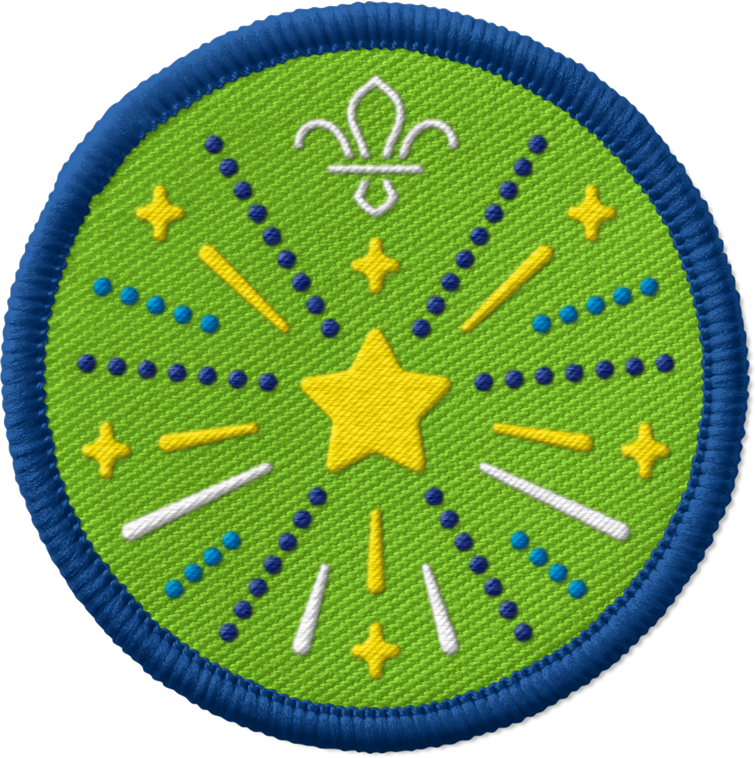
Celebrate Holi with a colourful scavenger hunt
You’ll need
- Coloured pens or pencils
- A4 card
- Pens or pencils
- Holi is a popular Hindu festival that usually happens in March, marking the arrival of spring. It celebrates love, colour, and the triumph of good over evil.
- It’s sometimes known as the ‘festival of colours’ and is famous for its colour throwing celebrations.
- Holi is celebrated around the world, but particularly in India and Nepal. Although it’s traditionally a Hindu festival, it’s inclusive and enjoyed by people who aren’t Hindus too.
- In Hinduism, the festival is linked to the Hindu god Krishna and legends where good triumphs over evil.
- It takes place over two days. The first night usually involves bonfires, to celebrate the triumph of good over evil. The next day, people get together and have fun throwing brightly coloured powder and water at each other.
Scouts is open to everyone. We don’t identify exclusively with one faith, and we welcome people of all faiths and of none.
We know it’s important for people to learn about each other, including understanding different faiths and beliefs. Scouts always respects people’s beliefs, faiths and cultures, and everyone should be open to learn.
As an inclusive and values based movement, we support our members to engage and learn about different faiths and beliefs in an exciting and meaningful way, even if they don’t have a faith themselves.
Celebrating and understanding differences, including differences in faiths and beliefs, is an important part of our Scout values, which are:
- Integrity: We act with integrity; we are honest, trustworthy and loyal.
- Respect: We have self-respect and respect for others.
- Care: We support others and take care of the world in which we live.
- Belief: We explore our faiths, beliefs and attitudes.
- Co-operation: We make a positive difference; we co-operate with others and make friends.
Our value of Belief and its exploration helps Scouts to learn from other faiths and beliefs. This encourages them to develop or build their personal beliefs and understand their shared values, whether faith-based on not.
We know that learning about faiths, beliefs and different attitudes can help to break down barriers, helps us all to recognise what we have in common, and teaches us to value and respect other people. It also helps us to build up respect, acceptance and knowledge for each other, leading to a more co-operative and inclusive society.
In our diverse society, people can sometimes feel cautious talking about this sensitive subject. However, it's important that Scouts offers young people safe, exciting and open spaces to explore faiths and beliefs. They should be able to engage in personal reflection, as they question and develop their opinions and understanding of the world around them.
Making time for personal reflection and developing our beliefs means exploring the places, people, communities, celebrations or stories which hold meaning for us, and it may not necessarily mean exploring a faith.
For example, someone’s shared values may be their Scout Values and that person may choose to reflect on them at important times, such as when they make their Promise. Others may choose to reflect at certain times of the year, such as a faith-based festival, birthdays, meaningful events or at New Year. Some people may still celebrate events, such as Christmas, but use it as a time to celebrate family, friends and loved ones, as well as for charity and giving.
Discover more about Faiths and Beliefs in Scouts.
Before you begin
- Use the safety checklist to help you plan and risk assess your activity. There's also more guidance to help you carry out your risk assessment, including examples.
- Make sure all young people and adults involved in the activity know how to take part safely.
- Make sure you’ll have enough adult helpers. You may need some parents and carers to help.
Planning and setting up this activity
- You could ask everyone wear colourful clothes, or their favourite colour, as Holi is the festival of colours.
- Before everyone arrives, you may want to add some extra items around the space or hide them if there are not many colours to find, such as beanbags, coloured tokens or felt tips.
Run this activity
- Gather everyone together and ask if anyone’s heard of Holi. See if anyone knows what it is, who celebrates it and how people celebrate.
- Explain that Holi’s a popular Hindu festival that usually happens in March, marking the arrival of spring. It celebrates love, colour, and the triumph of good over evil. It’s sometimes known as the ‘festival of colours’ and is famous for its colour throwing celebrations.
- Tell everyone that you’re going to do a colour scavenger hunt to celebrate Holi. Explain that you’re going to get into teams and see which team can find the most.
- There are lots of ways to run your colour scavenger hunt. You could:
- Get each team to look for a certain coloured token each. The team that finds the most tokens at the end of a set time is the winner.
- Ask teams to find one of each coloured token and bring them back, but with only one team member looking at a time. The first team to get the set of colours wins.
- Ask people to find things that are a specific colour and the first team to bring back an item that is that colour gets a point. The team with the most points at the end is the winner.
- Give people a clue for a colour to find and, again, the first team to bring back an item in that colour gets a point. For example, the colour of postboxes (red) or the colour of grass (green).
- If people are wearing colourful items, it might be best to have a rule that you can’t count anything you’re wearing.
- Players could get points for being the fastest to bring back an item of the right colour, or an extra element could be added, such as finding the smallest or most original item. Points could be given for teamwork too.
- When everyone’s ready, get into teams and get searching.
Reflection
This activity got everyone thinking about the international community and different faiths and beliefs.
Are there any similarities between Holi and any other festivals or celebrations people take part in? People might suggest Chinese New Year, also known as the spring festival.
Colour is a big part of Chinese New Year too, with a focus on the colour red, which is said to bring good luck.
People may also think about Valentine’s Day as another celebration of love.
Why is it important that people learn about festivals and celebrations that they don’t celebrate?
People might suggest that they help us understand each other better, respect what is important to others, and teach us about history and cultures. How would it feel if people didn’t understand and respect things that were important to you?
Safety
All activities must be safely managed. You must complete a thorough risk assessment and take appropriate steps to reduce risk. Use the safety checklist to help you plan and risk assess your activity. Always get approval for the activity, and have suitable supervision and an InTouch process.
- Active games
The game area should be free of hazards. Explain the rules of the game clearly and have a clear way to communicate that the game must stop when needed. Take a look at our guidance on running active games safely.
- Scissors
Supervise young people appropriately when they’re using scissors. Store all sharp objects securely, out of the reach of young people.
- Glue and solvents
Always supervise young people appropriately when they’re using glue and solvent products. Make sure there’s plenty of ventilation. Be aware of any medical conditions that could be affected by glue or solvent use and make adjustments as needed.
- To make this game harder, you could make the clues for the scavenger hunt colours or have smaller teams. You could also hide objects over a wider space.
- To make this game easier, let people play in bigger teams.
- If some people can’t move quickly or run, focus on the quality of the items people find rather than how fast they are.
All Scout activities should be inclusive and accessible.
If you enjoyed this activity, people could spot colours in nature with Colour-palette places.




